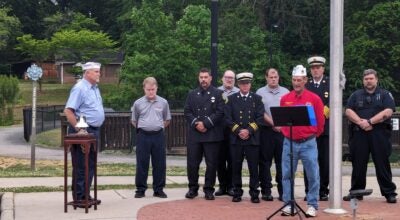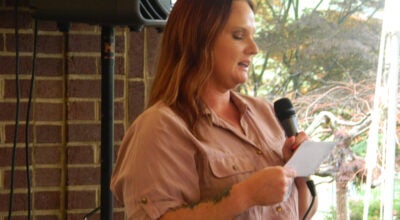Published 12:00 am Friday, June 28, 2013
SALISBURY — Holly Goddard Jones, author of “The Next Time You See Me,” told the audience at Trinity Oaks Thursday night that the title was not her first choice.
“Remains” was what she wanted to call her first novel, a mystery set in small-town Kentucky. No, too gruesome, the publisher said, too grim, too hopeless. “But there are several ways to interpret ‘remains’,” Jones said at the first installment of the Summer Reading Challenge.
She and the editor tossed titles back and forth and never hit on one. Jones, on vacation, tried “The Next Time You See Me,” and the editor approved. Problem was, that line was nowhere in the book. “I had to go back and work it in, and it’s still not that exact phrase.”
Publishers want “long, lyrical” titles now, and “I like short ones.” There was something hopeful about the new title — there’s a lot of darkness in the book. Jones said she thinks the title is both sad and hopeful, a presentation of the idea that it will be better.
The book is a mystery, involving a pair of sisters, a 13-year-old lonely girl, a 55-year-old lonely man who doesn’t know how to handle his feelings and a variety of other folks stuck in situations they don’t see a way out of.
One reader asked Jones if the book was in any way autobiographical, as so many first novels are. “I take little truths and build big fiction around them,” Jones explained. She opened her appearance by reading a passage about Wyatt, the 55-year-old still working in an electric motor plant after all these years. Jones’ father worked in such a plant, but, she emphasized, Wyatt is not her father. All Wyatt has to go home to is an old dog. Her father had a family. But her father is in his 51st year of working at the plant, too.
The 13-year-old, Emily, has a mentally challenged brother. So does Jones, but in a different way from the boy in the book.
Susanna is a teacher. Jones is a college professor.
But that’s as far as it goes. Susanna, who loses a great deal in the book. also has a bit of hope at the end. Susanna did all the right things — she went to college, met a great guy, got married, started her career, and had a beautiful daughter, but somehow it’s nothing like what she imagined or expected.
Wyatt’s life is a familiar routine, but not what he expected, either, and when his world begins to change, it threatens him, and leads him to violence.
The book, another reader said, was full of people making bad choices, and Jones agreed, many of the characters are the victims of their choices. It’s also a book about people mistreating their peers, and the spectrum of responses to that.
“Bad choices make interesting fiction,” Jones said.
Another reader asked Jones why she chose to read the part about misfit Wyatt. “I’ve done lots of readings. I get tired of the same ones. Plus, I like assuming different identities. … With Wyatt, I had to use a different set of tools to get into his personality.”
It took Jones, who is now working on another novel, four years to write this book. “Some people write every day, but I’m not one of those people.” She teaches creative writing in the University of North Carolina at Greensboro’s well-known creative writing program.
She won’t say much about her next book. “It’s pretty different from this one. I’m sort of superstitious about talking about it.”
Summer Reading Challenge participants will next hear from Bonnie Jo Campbell, author of “Once Upon a River” on Thursday, Aug. 8, at 7 p.m. at Trinity Oaks. Campbell, who lives in Michigan, will join the group via Skype on the Internet.
Dr. Forrest Anderson facilitated the conversation with Jones. Barbara Setzer, who has helped organize the challenge for the nine years, introduced Anderson and thanked the sponsors of the challenge, including Trinity Oaks, which also provided refreshments, Salisbury Post, Catawba College, Livingstone College, F&M Bank, Dr. Sheila Brownlow and Deal Safrit and Barbara and David Setzer.




